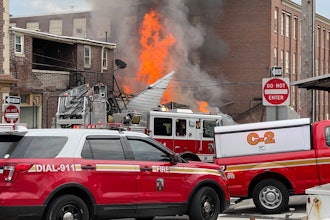The Island End and Mystic Rivers in Everett are…
EPA and MassDEP have issued a modification to ExxonMobil’s stormwater discharge permit to the Island End River, a tributary to the Mystic River. The permit modification incorporates the substantial improvements that ExxonMobil has made to the stormwater management system at its Everett Terminal, working in accordance with a 2009 memorandum of understanding between EPA Region 1 and ExxonMobil, which was entered into as part of a settlement to resolve a permit appeal brought by the company before the U.S. Environmental Appeals Board in 2008. The facility upgrades greatly improve the capacity of the stormwater system to collect, store and treat large storm events and provide advanced treatment for residual contaminated groundwater that infiltrates into the stormwater collection system.
“Cleaning our urban waterways unlocks the potential for these special places as a valuable resource for all our citizens. It’s a high priority for EPA to help urban waters become revitalized assets for New England communities,” said Curt Spalding, regional administrator of EPA’s New England office. “This collaborative action brings measureable results to these local urban rivers and is an important part of EPA’s work in the Mystic River Watershed.”
Under the 2009 agreement between EPA and ExxonMobil, the company agreed to move forward with these improvements in the absence of a final permit so that it would be in a position to comply with all aspects of the permit modification upon the date of final permit modification issuance. In turn, EPA agreed to time the issuance of the final permit modification to allow ExxonMobil to complete its upgrades so long as certain interim milestones were achieved. Upon the effective date of the final permit modification, all components of the upgraded stormwater and groundwater management system will come online and become fully operational.
In addition, during the period between 2009 and June 2011, ExxonMobil conducted significant maintenance of its storm sewer system which included cleaning and inspecting over 150 vertical drainage structures and mapping over 5 miles of on-site piping. Repairs were made to over 50 vertical structures to reduce the infiltration of contaminated groundwater in those structures. Annual inspections and modifications to the storm drain system continue, along with investigations of potential groundwater contamination source areas. ExxonMobil's permit now requires on-going operation and maintenance programs which include enhanced sediment control have also contributed to improved water quality in its discharge.
Under the permit modification, the new and modified facilities are required to address stormwater flows, infiltrating groundwater and other permitted discharges, under a variety of flow scenarios, which vary widely at the 110 acre site. This final permit modification requires a comprehensive system that provides treatment of effluent before discharge in all but the most extreme storm events exceeding the 10-year, 24 hour design storm event calculated at 13,600 gallons per minute (gpm). The combined system provides continuous treatment of flows up to 280 gpm (over 12 million gallons per month) through sand filters and activated carbon to address contaminated groundwater flows which occur in dry and wet weather.
These actions align well with the goals of the Mystic River Watershed Steering Committee to improve water quality, public access, and open space throughout the Mystic River watershed. The Mystic River Watershed Steering Committee is comprised of non-for-profit community groups as well as local, state, and federal agencies who work collaboratively to improve environmental conditions throughout the watershed.
EkOngKar Singh Khalsa, Director of the Mystic River Watershed Association (MyRWA), said, “The Mystic River Watershed Association is very pleased that ExxonMobil Pipeline Corporation has completed work to upgrade stormwater infractructure on its Everett Terminal site. Since 2007, MyRWA has advocated for the terminal to come into full compliance with stormwater regulations. After significant investment by ExxonMobil this has been achieved. We congratulate ExxonMobil, United States Environmental Protection Agency (US-EPA) and the Massachusetts Department of Environmental Protection (MassDEP) on developing the binding agreement that led to the site coming into compliance with the new NPDES permit. There is still much work to be accomplished to improve water quality conditions in the Island End and Mystic Rivers. This represents a very important step towards that objective.”
More information: The final permit modification and additional information can be found at http://www.epa.gov/region1/npdes/mass.html#poi
# # #






















